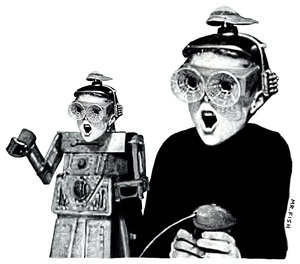Time After Time
One of the most obvious and deeply unsettling failings of our human character is our inability to accept just how much sway the lizard portions of our brains have over our behavior and just how short we continue to fall when attempting to achieve synchronicity with our highest ideals.One of the most obvious and deeply unsettling failings of our human character is our inability to accept just how much sway the lizard portions of our brains have over our behavior.
In the Dec. 14, 1963, issue of Time magazine, which was a special issue commemorating the life and death of the recently slain President Kennedy, there was a section devoted to the assassination that contained several captioned frames taken from the Zapruder film. One such frame depicted the first lady, Jacqueline Kennedy, climbing out of her seat and onto the back of the car only moments after witnessing her husband’s head explode into stroganoff, the accompanying text suggesting that she was bravely attempting to get help, reaching out in fact to help Secret Service agent Clint Hill into the vehicle. Several months after the publication of the photograph, Lenny Bruce was sitting in a courtroom in New York suffering the outrage of a prosecutor named Richard Kuh, who couldn’t believe that the comedian had the chutzpah to suggest an alternate reading of the image, specifically one that didn’t cast the late president’s wife as the heroine so conceived by the editors of Time magazine.
“Why this is a dirty picture,” concluded Bruce in his nightclub routine, “is that if my daughter is sitting with her husband and he gets his face shot off and she hauls ass to save her ass she’ll feel guilty and low because she’s not like the good woman who stayed with her old man. That’s why those values seem a little corrupt to me. [It’s] a dirty lie to tell the people that if you’re good you’ll stay, because the people who believe the lie can [then] sit in judgment and indict.” With eyes like laser beams, Bruce ended the bit by saying, “You can’t make the false image and then make my daughter pay the dues for [Jackie Kennedy] who didn’t stay.”
It happens to me all the time. I’ll go to a peace rally and work myself into such a rage at the stupidity of warmongers that I can’t shake the fury out of my fists. Or I’ll be standing in the checkout line at the grocery store feeling like the most enlightened and well-read brainiac on the planet, my cart filled with organic vegetables, cage-free eggs and raw honey, when I’ll notice a bin of discounted DVDs at the register. One of the DVDs will be called “Shark vs. Giant Squid” and I’ll nearly drive into a tree on the way home because I’m so distracted playing out the epic battle suggested by the title in my head, my insides aching with regret that I didn’t have the balls to lay down the five bucks to see what promised to be the most spectacular contest ever conceived by knuckle-dragging imbeciles this side of cockfighting.
What I like most about Bruce’s observation is how precisely it targets one of the most obvious and deeply unsettling failings of our human character, namely our inability to accept just how much sway the lizard portions of our brains have over our behavior and just how short we continue to fall when attempting to achieve synchronicity with our highest ideals. As a result, we find ourselves much more likely to believe we are what we wish to be instead of who we really are.
For example, I’m forever hearing complaints about Wall Street and how cutthroat the richest multinational corporations are when bleeding the middle and lower classes financially dry. The criticism is usually based on the ludicrous assumption that capitalism is an economic system devised by enlightened men to serve the public good and that only through strict government regulation and fair application by the business sector can abuse by elites be averted. The complainer always seems to somehow miss the basic fact that capitalism can function effectively only as long as there is devastating financial inequality within a given society and that to exist at all, the inequity must be rigorously and deliberately maintained by Wall Street and the richest multinational corporations. After all, it is precisely the absence of capital from one pocket that provides value to the capital held in another, as the accumulative value of wealth requires there to be a point of comparison from which to determine relevance. (There would be absolutely no value in a dollar bill if everyone in the world was equal and had only one.) So, for anyone to assume that such a system could ever be benign, one would have to have zero insight into the tribal and prejudicial nature of people everywhere regardless of where they reside in the hierarchy.
There are similar complaints about any number of politicians who bogart political capital in the same way and for the same reasons that financial institutions bogart economic capital. And then there is sexual capital. And academic and intellectual capital. And there is the capital of violence.
When my wife was diagnosed with breast cancer on her birthday in 2007, I refused to interpret the news as being tragic, although it was. I figured that it was going to be my job to do everything I could to contradict the message that I knew she was already machine-gunning, like Tokyo Rose, into the healthy cells that lived inside her body, that message being: You are full of disease and you are going to die. For the many months that spanned her treatment, I did my best to keep morale high and to jam the broadcast of this black telepathy with my own unflinching conviction that everything was going to be OK. “How do you know that I’m not going to die?” she asked me once, exhausted by chemotherapy and worried about leaving our children motherless.
“Because I know,” I said, imagining millions of terrified cells clinging so desperately to one another and eavesdropping on our conversation from the center of her gut.
“How can you know?” she asked.
“Because,” I said, “I just know.”
“But you can’t know,” she sighed, her voice so full of woe as to suddenly fill my heart with stones.
“I know,” I said, smiling back at her. She opened her mouth to speak and then stopped herself, unsure as to whether I was saying that I knew that she was right and that I couldn’t know or that I knew for sure that she wasn’t going to die. When she didn’t ask for clarification and laid her bald head down upon my chest and fell asleep, I pictured Jacqueline Kennedy, polka-dotted with blood and brain tissue, skittering across the back of a dark blue 1961 Lincoln Continental convertible in the Dallas sunshine and looking for a place upon which to stand and to cross her arms and to throw out her chest, certain that her defiance would be enough to deflect bullets.
Your support matters…Independent journalism is under threat and overshadowed by heavily funded mainstream media.
You can help level the playing field. Become a member.
Your tax-deductible contribution keeps us digging beneath the headlines to give you thought-provoking, investigative reporting and analysis that unearths what's really happening- without compromise.
Give today to support our courageous, independent journalists.





You need to be a supporter to comment.
There are currently no responses to this article.
Be the first to respond.